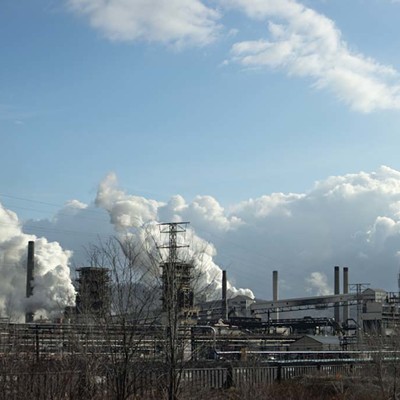Christopher Abruzzo, who was confirmed last week as head of Pennsylvania's Department of Environmental Protection, has scant experience as an environmental regulator. Some critics call him unqualified for the job.
The sad thing is, for the DEP under the Corbett adminstration, Abruzzo might actually represent a step up.
Abruzzo had been acting director since April. His predecessor, Michael Krancer, was a former energy-industry lawyer who, as the state's top environmental regulator, was known for praising the shale-gas industry and publicly condemning researchers who questioned drilling's environmental impacts. Perhaps Abruzzo — a longtime state prosecutor whom the administration touts as a "problem-solver" — won't quite so vociferously defend the industry he's charged to oversee.
Nonetheless, Krancer's views on climate change — he questioned the scientific consensus on earth's top environmental problem — came to mind during Abruzzo's Dec. 4 confirmation hearing. The acting secretary acknowledged that earth's climate is changing, and agreed government should address the issue. But that was as far as it went. Asked by state Sen. Daylin Leach whether climate change is "a bad thing," Abruzzo made a palms-up, "beats me" gesture, then said, "I've not read any scientific studies that would lead me to conclude that there are adverse impacts to human beings or to animals or to plant life at this small level of climate change. But I agree there are impacts."
Actually, countless "scientific studies" — including many cited by reports out of Abruzzo's own department — enumerate many "adverse impacts" of climate change: rising and acidified seas; more heat waves, floods, droughts and smog; uncertain crop yields; bigger storms; and animal and plant extinctions. "It's stunning that someone who would be appointed to this position would have such a dearth of knowledge on this," says Jeff Schmidt, director of the Sierra Club's Pennsylvania chapter.
Still, the DEP secretary has a boss. So perhaps what's most important here isn't Abruzzo's knowledge, but Corbett's position on things like climate change. But if you think that Pennsylvania — the nation's third-biggest carbon-emitter — should try harder to reduce its carbon footprint, don't hold your breath.
Patrick Henderson, Corbett's powerful top adviser on energy issues, acknowledges that climate change is real. "It's an issue that we certainly have to be seriously concerned about," he told City Paper in a phone interview last week. Believe that if you like: Schmidt says he can't recall Corbett, in his three years in office, ever mentioning climate change. But that "serious concern" is (again) about as far as things go. Henderson, emphasizing that carbon emissions are a global problem, says Pennsylvania ought not reduce its emissions too much just yet: "We don't want to see significant gains as far as Pennsylvania or the United States, negated because ... other nations don't hold themselves to the same standards."
That echoes Abruzzo on Dec. 4: "I think Pennsylvania is already doing at least its fair share, if not more than its fare share" on climate change.
So you're unlikely to see, for instance, Corbett supporting bills (like one that recently died in committee) to raise the percentage of renewable energy the state requires of electricity generators. Henderson says raising current standards (adopted pre-Corbett) would "disrupt market investment decisions" in the energy industry.
It gets worse. The DEP delivered its latest Climate Impact Report in October — 18 months late — and we're still waiting for the new Climate Action Report that was also due in 2012. Henderson says state law doesn't require those reports to be submitted by any "hard and fast date." But Christina Simeone, who chairs DEP's Climate Advisory Committee, disagrees. She also says DEP has deprioritized climate change. "The DEP really just does not have the resources and expertise to devote to developing this work plan" to reduce emissions, says Simeone, a staffer for environmental group PennFuture. In July, Joe Sherrick told news service StateImpact Pennsylvania that he'd recently quit his job as DEP climate-change program manager for much the same reason.
Henderson says DEP does have "the appropriate staff complement to address the suite of air-quality issues that Pennsylvanians face," of which climate is just one.
Simeone agrees that the administration has resources: "They just haven't put them toward climate initiatives."













